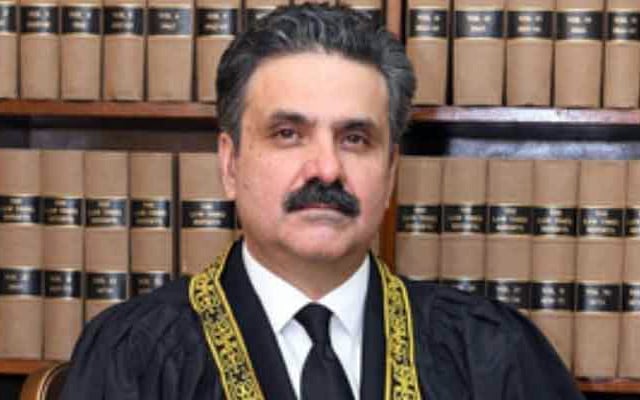
Chief Justice of Pakistan (CJP) Yahya Afridi has passed the buck to the committee of constitutional benches for the formation of a full court to hear petitions challenging the 26th Constitutional Amendment.
A three-judge committee, led by Justice Aminuddin Khan and comprising Justices Muhammad Ali Mazahar and Jamal Khan Mandokhail, will decide the total number of members for the constitutional bench hearing such petitions.
Interestingly, the committee itself is the creation of the amendment which is being challenged.
The judges for constitutional benches were selected by government representatives during the first meeting of the Judicial Commission of Pakistan (JCP). Likewise, two members of the constitutional bench have also supported the government's suggestion to nominate Justice K K Agha as head of the Sindh High Court's constitutional bench.
The government, it seems, is completely satisfied with the Supreme Court's constitutional bench, especially the head Justice Aminuddin. A debate also continues as to whether CJP Afridi could have formed a full court to hear petitions against the 26th Constitutional Amendment.
Justice Syed Mansoor Ali Shah, in his recent letter, noted that Clause 3 of the newly-added Article 191-A of the Constitution bars the hearing of matters specified therein by any bench of the Supreme Court other than a constitutional bench, but does not bar the full court of the Supreme Court from hearing any matter, including petitions filed under Article 184-3 of the Constitution.
"The distinction between the full court and the benches of a court is well established and explicitly recognised in Article 203J(2)(c) & (d) of the Constitution," he wrote.
"However, if your lordship has any doubt regarding this constitutional position, the same may also be judicially decided by the full court of the SC before addressing the merits of the said petitions," continues Justice Shah in his letter to CJP Afridi.
Meanwhile, six renowned lawyers have written letters to CJP Afridi for the formation of the full court, including former Supreme Court Bar Association presidents Hamid Khan, Muneer A Malik, Abid Zuberi, as well as ex-Sindh High Court Bar Association president Salahuddin Ahmed, Khwaja Ahmed Hosain and Zainab Janjua.
The details of their respective petitions are mentioned in which they state that the earliest such petition was presented at the registry on October 24, 2024.
"A month has passed and despite the constitutional and public urgency of the matter, the cases are not closer to being fixed for hearing. Even more surprisingly, none of the petitions were assigned a number in the registry. Also, office objections to the petitions have not been communicated by the registrar," the lawyers note.
The letter states that some of these petitions were presented before the first meeting of the new JCP and the formation of constitutional benches. "They included specific prayers for interim relief, and urgent applications for listings of the matter."
It is worth mentioning that Section 7 of the Supreme Court (Practice and Procedure) Act 2023 explicitly requires that an application pleading urgency, or seeking interim relief, shall be fixed for hearing within fourteen days from the date of its filing.
"The delay is inexplicable," according to these senior lawyers.
All of the petitioners seek that their applications be taken up and heard by a full court of the SC, as they existed before the passing of the 26th Constitutional Amendment.
"Needless to say, the very creation of a legislative instrument cannot examine the vires of the instrument that creates it," the lawyers state.
They also urge CJP Afridi to initiate an inquiry into the unprecedented manner in which the court office dealt with these petitions. They asked that he ensure that all the petitions are placed before the full court as already decided by the majority of the Practice & Procedure Committee, as per its decision of October 31, 2024.
Former additional attorney general Tariq Mahmood Khokhar says that the 26th Constitutional Amendment rewrote the fundamentals of the judiciary.
"It constitutes a violation of the constitution and subverts it by other means. Petitions challenging it are of utmost urgency, and must be heard by the full court.
Yet, the CJP is unmoved."
He says the effect will be to present the people of Pakistan with a fait accompli; enabling the executive-controlled judicial commission to nominate judges to constitutional divisions and appoint new judges thereby packing courts.
"This will increase the number of Supreme Court justices from 17 to 34, thereby creating a permanent majority favouring the established order. The supreme court is under assault from within and without: inbred kowtowing to the extraneous forces," he asserts.
"There are honourable exceptions, but if the present state of affairs continues, the 26th Constitutional Amendment will have created facts rendering all petitions infructuous and superfluous."
He also believes that Justice Shah has the capacity and the moral courage to enable damage control and restore some semblance of status quo ante. "However, the CJP appears determined to thwart him," he concludes.


1718857896-0/Madonna-(1)1718857896-0-405x300.webp)
1733729230-0/jay-z-(1)1733729230-0-165x106.webp)

1734135272-0/Jay-Z-(2)1734135272-0-165x106.webp)













COMMENTS
Comments are moderated and generally will be posted if they are on-topic and not abusive.
For more information, please see our Comments FAQ